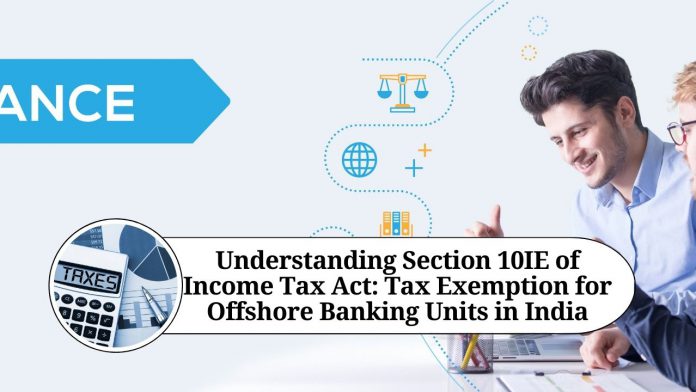Section 10IE of the Income Tax Act is a provision that provides tax exemption on income earned by offshore banking units (OBUs) in India. In this blog, we will discuss Section 10IE in detail, including its applicability, benefits, and limitations.
Introduction to Section 10IE of Income Tax Act
Section 10IE of the Income Tax Act is a recent addition that aims to promote offshore banking activities in India. The provision provides tax exemptions to offshore banking units (OBUs) operating in Special Economic Zones (SEZs) and International Financial Services Centres (IFSCs) in India. The purpose of this provision is to attract foreign investment in India and to make India a global financial hub.
Applicability of Section 10IE of Income Tax Act
Section 10IE is applicable to OBUs located in SEZs and IFSCs in India. However, to be eligible for the tax exemption, OBUs must have been set up after April 1, 2015. Moreover, these units must comply with certain regulations and guidelines laid down by the Reserve Bank of India (RBI).
Benefits of Section 10IE of Income Tax Act
- Tax Exemption: One of the main benefits of Section 10IE is that it provides a tax exemption on the profits earned by offshore banking units. This exemption applies to income generated from banking activities such as lending, borrowing, trading, investing, and foreign exchange transactions.
- Foreign Currency Transactions: OBUs can conduct transactions in foreign currency without any restrictions. This flexibility in foreign currency operations enables OBUs to offer a wide range of services to offshore clients.
- Ease of Doing Business: The tax exemption and flexible regulations make it easier for foreign banks to set up offshore banking units in India. This, in turn, can help to boost the country’s economy and make it a global financial hub.
- Job Creation: The establishment of offshore banking units can create job opportunities for skilled professionals in India, contributing to the country’s economic growth.
Limitations of Section 10IE of Income Tax Act
- Limited Applicability: Section 10IE is applicable only to OBUs located in SEZs and IFSCs, and not to other types of offshore entities.
- Eligibility Criteria: OBUs must meet certain criteria, such as maintaining separate books of accounts, to be eligible for the tax exemption.
- Limited Activities: OBUs are restricted from engaging in certain banking activities, such as accepting deposits from Indian residents.
Limitations of Section 10IE of Income Tax Act
- Limited Applicability: Section 10IE is applicable only to OBUs located in SEZs and IFSCs, and not to other types of offshore entities.
- Eligibility Criteria: OBUs must meet certain eligibility criteria to be eligible for the tax exemption. For instance, they must maintain separate books of accounts and comply with RBI regulations.
- Restricted Activities: OBUs are restricted from engaging in certain banking activities such as accepting deposits from Indian residents. This restriction is put in place to protect the Indian financial system and prevent money laundering.
Conclusion
In conclusion, Section 10IE of the Income Tax Act is a welcome addition that aims to promote offshore banking activities in India. The provision provides tax exemptions to offshore banking units located in SEZs and IFSCs and offers several benefits such as tax exemptions, flexibility in foreign currency transactions, and job creation. However, OBUs must comply with certain regulations and guidelines to be eligible for the tax exemption. If you are planning to set up an offshore banking unit in India, it is essential to consult a tax professional to ensure compliance with the law.
Read more useful content:
- section 234e of income tax act
- section 286 of income tax act
- section 90a of income tax act
- section 40a(7) of income tax act
- section 226(3) of income tax act
- section 24 of income tax act
Frequently Asked Questions (FAQs)
What is Section 10IE of the Income Tax Act?
Section 10IE is a provision in the Income Tax Act that provides tax exemptions on income earned by offshore banking units (OBUs) located in Special Economic Zones (SEZs) and International Financial Services Centres (IFSCs) in India.
Who is eligible for the tax exemption under Section 10IE?
OBUs located in SEZs and IFSCs set up after April 1, 2015, are eligible for the tax exemption under Section 10IE.
What types of banking activities are covered under Section 10IE?
The tax exemption under Section 10IE applies to income generated from banking activities such as lending, borrowing, trading, investing, and foreign exchange transactions.
What is the tax rate for OBUs not covered under Section 10IE?
OBUs not covered under Section 10IE are taxed at a rate of 40%.
What are the benefits of setting up an OBU in India?
Setting up an OBU in India provides several benefits such as tax exemptions, flexibility in foreign currency transactions, ease of doing business, and job creation.
What are the restrictions on OBUs under Section 10IE?
OBUs are restricted from engaging in certain banking activities such as accepting deposits from Indian residents to prevent money laundering.
Can OBUs conduct transactions in Indian Rupees?
OBUs are not permitted to conduct transactions in Indian Rupees. They can only transact in foreign currency.
Do OBUs need to maintain separate books of accounts?
Yes, OBUs need to maintain separate books of accounts to be eligible for the tax exemption under Section 10IE.
Is Section 10IE applicable to all types of offshore entities?
No, Section 10IE is applicable only to OBUs located in SEZs and IFSCs in India.
Can OBUs be set up by Indian companies?
Yes, Indian companies can set up OBUs in SEZs and IFSCs in India to take advantage of the tax exemptions and other benefits.




















